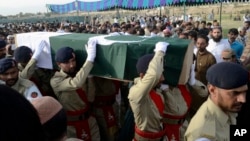Pakistan's human rights commission Monday slammed "blatant, aggressive and unabashed" attempts to manipulate the upcoming election, as politicians expressed security fears following one of the country's deadliest attacks.
A string of attacks has killed 175 people across the country in the past week, and there have been widespread allegations that the powerful military is meddling in the run-up to the July 25 vote.
The Election Commission has vowed to go ahead with the vote "at all costs."
But the independent Human Rights Commission of Pakistan warned it was "gravely concerned over what it sees as blatant, aggressive and unabashed attempts to manipulate the outcome of the upcoming elections."
"While it is critical that the polls are held as scheduled, there are now ample grounds to doubt their legitimacy — with alarming implications for Pakistan's transition to an effective democracy," it said in a statement.
A suicide blast at a political rally in the southwestern province of Balochistan last Friday killed 149 people.
It was the second deadliest militant attack in Pakistan's long battle with violent extremism, surpassed only by an assault on a school in 2014 which left more than 150 people dead.
The attack and others have spurred a surge in criticism of the army. It has overseen a dramatic improvement in security but in recent months has been widely accused of what one think-tank termed a "silent coup."
"The attacks are taking place because the security agencies are involved in politics and not doing their job," Mushahidullah Khan, a senior leader with the Pakistan Muslim League-Nawaz (PML-N), told AFP.
"The elections are being contested in an environment of fear," the chairman of the Pakistan Peoples Party, Bilawal Bhutto-Zardari, said during a visit to the Balochistan provincial capital Quetta on Monday.
"Security should be the top priority for the government," he said, adding: "I hope that the election will be held on July 25."
Other politicians from parties across the political spectrum have echoed his concerns.
The accusations against the military were heightened Friday, when former PML-N premier Nawaz Sharif returned to the country from London and was imprisoned, heightening political tensions.
Sharif was ousted from power last year following a corruption investigation. He was sentenced in absentia to 10 years in prison for alleged corruption earlier this month.
He and his party say they are being targeted by the military, which has also faced accusations from the media, analysts and other politicians that it is using threats and intimidation to steer votes towards Imran Khan's Pakistan Tehreek-e-Insaf party.
The military denies the allegations and says it is taking "no direct role" in the election.
It has already warned of a security threat in the run-up to the vote and said it will deploy more than 370,000 soldiers on polling day.
Rights Group Warns of 'Blatant' Bid to Manipulate Pakistan Vote

ISLAMABAD —



